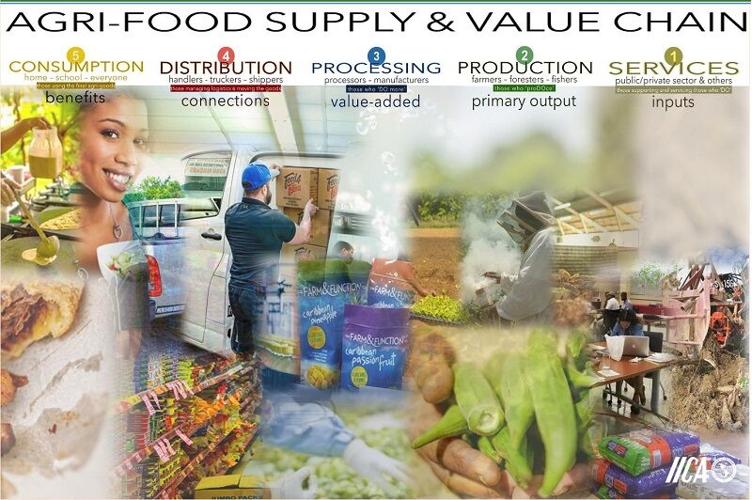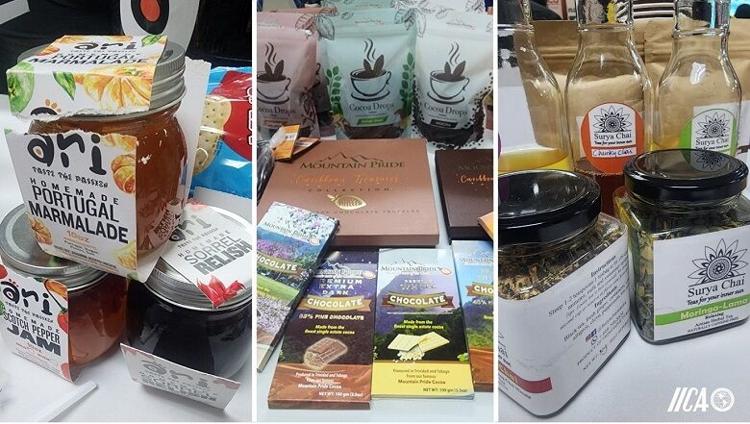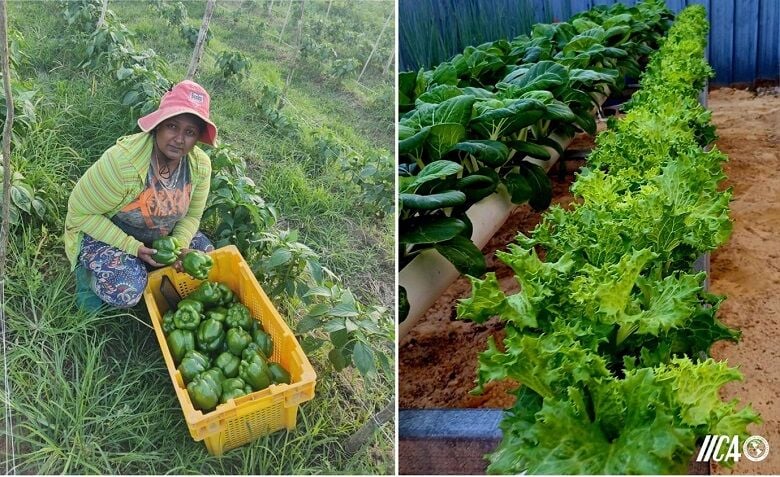
Illustration of demand-driven Agrifood value chain (photo by IICA-TT).
Republic Bank Trinidad and Tobago launched a new financial product specific to agrifood value chain stakeholders on May 1, 2024. This news generated expectations along the excitement to uncertainty spectrum. For institutions, such as the Inter-American Institute for Cooperation on Agriculture (IICA), this can only be seen as a positive development not only for stakeholders in the local agri-food value chain, but also hopefully and eventually, for their peers in other Caricom countries where Republic Bank operates.
|
“Even if only for Trinidad and Tobago, this has implications for the wider effort to expand participation of the commercial financial sector in the agrifood industry in Caricom. There is already much interest in Caricom, particularly since the loan’s terms and conditions are designed to meet the needs of small farmers, processors, distributors and others along the value chain” |
The call for more commercial financial institutions to get involved in agrifinancing traces back to the late 1970s Caricom Regional Transformation Programme for Agriculture (RTPA). In each successive Caricom agricultural development strategy, ‘limited financing and investment in agriculture’ and ‘lack of involvement of the private sector’ have been like chronic diseases negatively impacting transformation, innovation and competitiveness of agri-food industries. One successive Caricom strategy, the 2002 Jagdeo Initiative, led by then President of Guyana, stressed that in the changed global environment, the “agricultural sector was neither providing for food security nor earning the foreign exchange to cover the Caribbean’s growing food import bill.”
Fast forward to 2024, fifty-one years after the 1973 Treaty of Chaguaramas which spawned the RTPA, the global environment has changed even more fundamentally, in every conceivable dimension of human sustainable development. Media reports at national, regional and international levels warn of excessive heatwaves, frequent and forever wars and civil unrest in almost all corners of the globe, plastic pollution moving beyond an ecosystem pollution problem to a human health reality due to microplastics, compounding the wider forever chemicals in the food safety challenge.

Sample of some of the several excellent local products from the AgriMSE sector (photo by IICA-TT).
There are also very obvious signs that the private sector in Caricom is engaging more in financing, investment and the development of the agrifood sector. Through the Caricom Private Sector Organisation, there is a concerted effort towards the most recent 25% x 2025 regional goal to reduce reliance on extra-regional food imports. They have prioritized 19 agri-industries across Caricom countries. They have also acknowledged the important role of the often-overlooked collective contributions of the extensive micro and small agri-enterprises (AgriMSEs) sub-sector. To meet these expectations, AgriMSEs along the entire agrifood chain will need financing.
Traditionally, governments in Caricom have established special purpose entities to provide agrifood stakeholders with development financing and business services. However, there is still a financing gap. Increasingly, this financing gap is seen as less one of a lack of available financing, and more one of barriers to access to the available financing.
|
“As competition for finance and development resources intensifies to meet wider social, health, education, economic and infrastructure needs of developing countries, a change in the financing-for-development dynamic cannot be avoided.” |
While necessary and helpful, reliance on project, donor and development funding is neither sufficient, nor sustainable for individuals, firms and industries in the agrifood value chain that provide employment, income opportunities and livelihoods. This is especially so, for AgriMSEs.
The Republic Bank’s Agribusiness Loan is therefore timely. Through two online information sharing sessions organised by IICA, one for entities providing technical support to transform and develop the sector, and the other for potential AgriMSE clients, the essential features of this product were clarified. There are only two major exceptions– this loan product does not cover agricultural land purchases, nor AgriMSE start-ups. Apart from this, the Republic Bank confirmed that all persons operating within the agrifood value chain in Trinidad and Tobago will have the opportunity to apply for this loan. The requirements to access have been designed to meet the applicant’s specific business purpose and operations. This makes the available financing for agriculture purposes more accessible.

Both traditional and alternative farming systems are eligible for the agribusiness loan (photo by IICA-TT).
This agribusiness loan also provides the platform for matching access to financing with access to technical support and services. A number of technical agencies, including IICA, CABA, MAFAS Ltd., i.e., non-financing/non-donor entities, have committed in principle to work with national state entities and other collaborators, to support the de-risking process, by providing technical, business and marketing backstopping to strengthen business viability and ultimately ensure good performing loans.
IICA looks forward to working with the champions at Republic Bank, led by P. Vic Salickram, Group Vice President, Republic Financial Holdings Limited and Vice President, Republic Bank Limited. We will continue to work closely with our key collaborators in helping to build and sustain the institutional ecosystem needed to ensure that this loan is both financially sound and business relevant to prospective AgriMSE clients.
The size of the agri-food sector financing gap can accommodate multiple financial sector actors. It is important that from the perspective of encouraging greater participation of the commercial financial sector, that the Republic Bank Agribusiness loan product initiative in Trinidad and Tobago is successful. This success is for the benefit of all stakeholders in agri-food value chains, for the continued relevance of agriculture development support entities, and ultimately, for the benefit of agriculture’s transformation in the region, including the goal of reducing extra-regional agri-food imports by 25% by next year, i.e., 2025.
Sobre la autora
 Diana Francis es graduada por la Universidad de las Indias Occidentales (UWI), San Agustín - BSc. Economics (1986-1989) y Cave Hill - MPhil Economics (1993-1996). Desde 1989, ha trabajado en desarrollo agrícola y rural, prestando apoyo político y comercial a escala nacional a través del Ministerio de Agricultura de Dominica, y desde 1993, a escala regional, con el Instituto Interamericano de Cooperación para la Agricultura (IICA). Ha prestado apoyo directo a CARICOM y a la Secretaría de la OECS, así como a distintos Ministerios de Agricultura, en la formulación de políticas y estrategias agrícolas, haciendo hincapié en la importancia de reconstruir una sólida capacidad de planificación para la aplicación eficaz de las políticas. Es autora/coautora de varias publicaciones y artículos escritos sobre diversos temas de desarrollo agrícola, así como de la elaboración y gestión de la ejecución de proyectos regionales financiados con fondos externos. Como actual Representante del IICA en Trinidad y Tobago (a partir de julio de 2019), gestiona la actividad de cooperación técnica del IICA en colaboración con una serie de socios estratégicos en áreas relacionadas con la resiliencia climática, sanidad agropecuaria e inocuidad de los alimentos, agricultura comunitaria y el desarrollo rural, la alimentación y la nutrición y, lo que es más importante, la prestación de apoyo coordinado y holístico al desarrollo de micro y pequeños agroprocesadores.
Diana Francis es graduada por la Universidad de las Indias Occidentales (UWI), San Agustín - BSc. Economics (1986-1989) y Cave Hill - MPhil Economics (1993-1996). Desde 1989, ha trabajado en desarrollo agrícola y rural, prestando apoyo político y comercial a escala nacional a través del Ministerio de Agricultura de Dominica, y desde 1993, a escala regional, con el Instituto Interamericano de Cooperación para la Agricultura (IICA). Ha prestado apoyo directo a CARICOM y a la Secretaría de la OECS, así como a distintos Ministerios de Agricultura, en la formulación de políticas y estrategias agrícolas, haciendo hincapié en la importancia de reconstruir una sólida capacidad de planificación para la aplicación eficaz de las políticas. Es autora/coautora de varias publicaciones y artículos escritos sobre diversos temas de desarrollo agrícola, así como de la elaboración y gestión de la ejecución de proyectos regionales financiados con fondos externos. Como actual Representante del IICA en Trinidad y Tobago (a partir de julio de 2019), gestiona la actividad de cooperación técnica del IICA en colaboración con una serie de socios estratégicos en áreas relacionadas con la resiliencia climática, sanidad agropecuaria e inocuidad de los alimentos, agricultura comunitaria y el desarrollo rural, la alimentación y la nutrición y, lo que es más importante, la prestación de apoyo coordinado y holístico al desarrollo de micro y pequeños agroprocesadores.
Nota: Este artículo se publicó por primera vez en Daily Express (Mayo 27, 2024). Taking agri-food sector financing commercial: Some change is needed and welcomed. Trinidad Express.
Las opiniones expresadas en este blog son responsabilidad de los autores y no reflejan necesariamente la opinión del IICA.
|
Si tiene preguntas o sugerencias de mejora del BlogIICA favor contactar a los editores: Joaquín Arias y Eugenia Salazar |
Añadir nuevo comentario